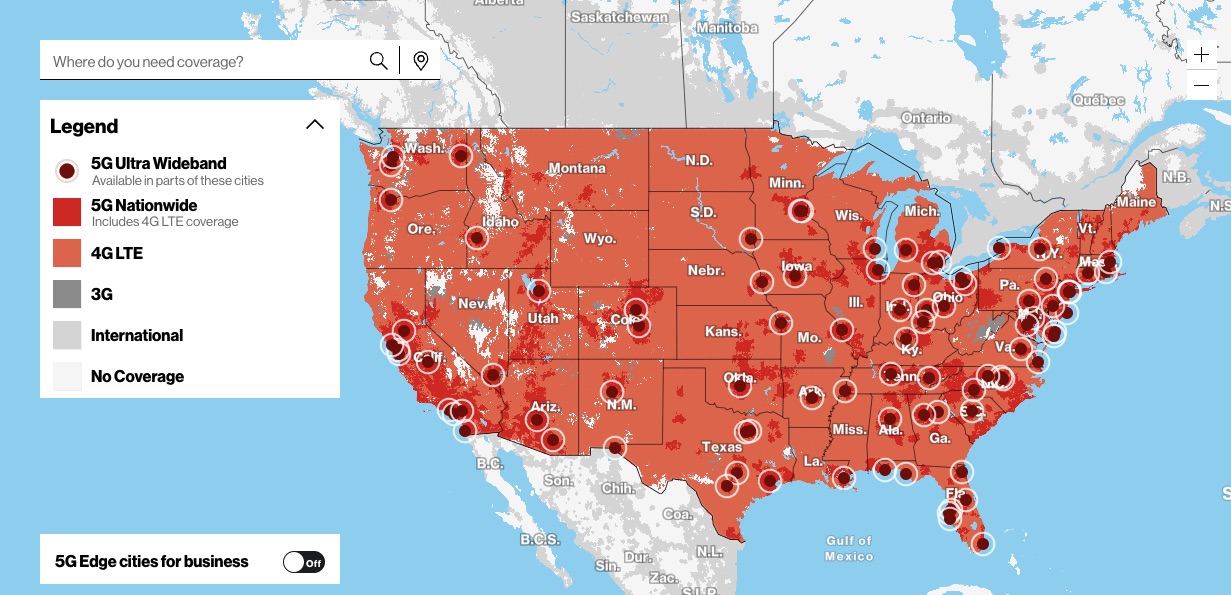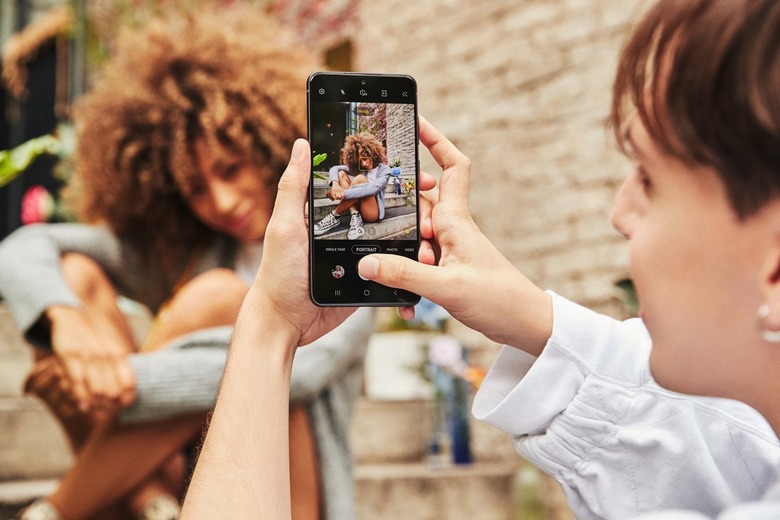How To Switch Cell Phone Carriers The Easy Way
Any time you buy a new smartphone, you probably take a look at your wireless carrier to see if they have any deals. While you're investigating which is the best phone for you, you may realize that your carrier is charging you way more than it should be. So while you can still get the smartphone upgrade of your dreams for a great price, you might have to deal with carrier contracts to make your dream a reality. You might even have to switch carriers to get a better offer on a particular phone model – or you might want to change mobile operators for entirely different reasons.
The bad news is that there might be some costs involved that you'd better be ready to pay up. The good news is that you can easily switch carriers if you want and some of them will be prepared to take care of those extra costs for you.
What to know about changing your phone carrier

A Verizon 5G map
There are various steps you need to consider before making the switch. First, you need to find out how much you still owe your current carrier for your contract and phone. Then you need to determine if you'll need to pay an Early Termination Fee. As Verizon points out, they are more or less things of the past. But you may have to pay one, depending on your carrier and when you got your last phone. These steps often involve money changing hands, and you'll be doing most of the paying.
Finally, you need to make sure you're ready for a smooth transition to your new phone, and that involves handling backups and data transfers. To many tech-savvy smartphone buyers, all the steps above sound natural enough, but if you're a new user, you might run into some issues along the way.
The carrier
Before you switch, you should get plenty of information on your current contract and phone. Call your carrier and ask them straight out about an ETF and how much you have left on your plan. Once you have an amount if at all, make sure you have the cash to cover it, and resist the temptation to upgrade your current contract, especially if you want to ditch your current cell phone service provider. Customer care reps will probably throw some offers your way to try to convince you to stay.
Also, make sure you don't cancel your service at this time. You'll probably want to transfer your current number to the new carrier. As WhistleOut points out, a new carrier doesn't have to accept your new number. But since they want your business, they more often than not won't have an issue doing so. So instead of canceling your plan during that call, which means canceling your number, you should ask the new carrier to port your current phone number for you, which will initiate the termination process with your old carrier. This is a common occurrence and most carriers will work with you on this.
Now that you know how much money you have to pay your carrier – ETF and full phone and plan cost – check out what the new mobile operator is willing to offer you in return for becoming a subscriber. Companies all have plans in place to entice you to switch over, but they vary... and you might have to wait a few months to get you reimbursed.
Deals for your new phone
Here's what AT&T, Xfinity, T-Mobile and Verizon will pay for you deciding to switch over currently:
- AT&T: $500 when you bring two devices to AT&T, savings up to $800 with trade-in, $250 in bill credit plus free wireless charger
- Xfinity: $50 prepaid card when you switch and bring your phone, up to $300 with trade-in
- T-Mobile: pay off entire old contract (up to $650 per line or $350 in ETF) and outstanding phone payments (up to $800) with Visa Prepaid card, but you'll also have to give T-Mobile your old phone
- Verizon: Prepaid Mastercard giftcard, new phone discounts, or up to $500 for a trade-in when you switch
- Mint Mobile: 6 months free with the purchase of a new device and enroll in a 6-month plan
Even so, these carriers will not pay you what you're due the minute you've switched over, especially when it comes to ETFs or receiving mailed prepaid cards. Unless the deal is to pay off your old balance, like T-Mobile, you have to pay your balance with your old carrier first.
Of course, if you don't want to get a contract anymore, then don't expect any carrier to buy you out of your current contract. Also, don't expect significant discounts for smartphones when going the prepaid route but some do give you enticing monthly payments.
The phone
iPhone 13 Pro max
You will have to check to make sure your old phone works on the new network if you're choosing to change it. Most allow you to bring your old device but will want you to upgrade. That's why the deals for upgrading are so good. As a result, you might have to switch phones when choosing a different carrier regardless of whether you like it or not.
In that case, make sure you backup your data first. Whether you're on Android or iPhone, there are many tools to save your contacts, pictures and videos, calendar, email, personal files and media files. You can perform regular backups automatically to a cloud of your choice, or manually on a computer.
When it comes to moving that data, you can contact the new carrier and old carrier. They will even help take you from Android to iOS and vice-versa. But don't ditch your phone before you've backed everything up.
Once you do save your data, make sure you delete that data from your old smartphone. That means you'll have to perform a reset to factory settings – and you should sign out of Find My iPhone and similar phone tracking apps – and then manually check that your personal data has indeed been removed from the device.
More phone coverage: Stay up to date on all the latest iPhone 14 news!
Editor's note: This article was originally published on December 8, 2015, and has since been updated.
